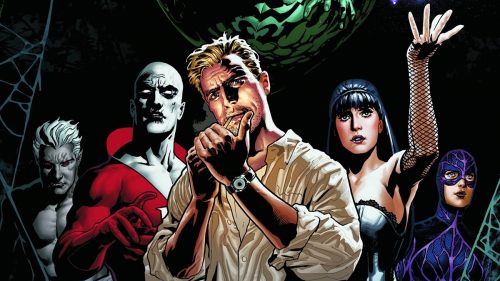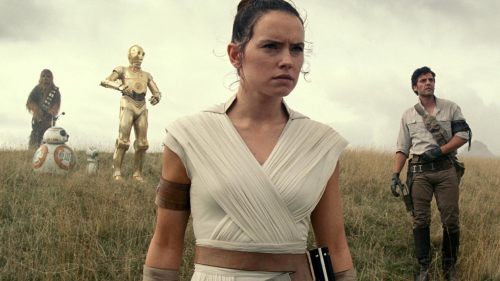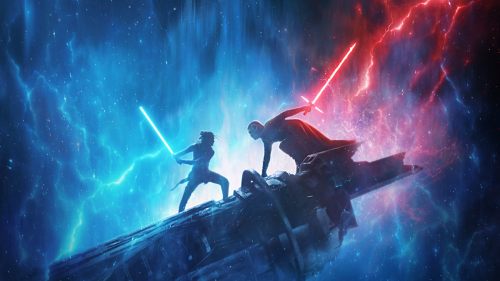10 CLOVERFIELD LANE Spoiler-Filled Review
This review is filled with spoilers. If you want a spoiler-free review, check out what Andrew had to say.
10 Cloverfield Lane is a weird beast. At its heart is a well-constructed script and excellent performances. In another life this movie, under a different title, is a tight, high-end indie genre film that announces director Dan Trachtenberg as an interesting talent to watch. But in this life that small film has been absorbed by Bad Robot, who have applied the LOUD NOISE! School of sound design, and then over-scored the movie on top of that. 10 Cloverfield Lane is a smart, often tense film that fundamentally mistrusts the audience and feels the need to distract and startle them out of fear they’re going to look at their phones.
Oh, and it has nothing to do with Cloverfield.
Mary Elizabeth Winstead has always been a great actress, but her performance here as Michelle is career-redefining; with very little dialogue she is able to create not just a full character but also bring us inside that character’s head. Michelle leaves her fiancee and drives away from her home into the unknown night, running away from her problems rather than solving them. On the road she finds herself in a brand new problem - her car wrecks in the middle of nowhere and she wakes up in an underground bunker, the ‘guest’ of John Goodman’s Howard.
Winstead is playing a video game character. Trachtenberg first got attention with a Portal fanfilm he directed, and you can see the DNA of Portal (among other things) in the film - a trapped woman must solve puzzles to escape an overly friendly captor. But what this means is that Winstead is playing the character we usually play in a video game, the character who doesn’t have much to say, who is always standing between two other characters as they talk about important story elements, the character who tags along while another character delivers exposition. It’s a hard role, and a thankless role, and she crushes it.
It might be her eyes that make her so great. In every scene, in every shot, you can see Winstead thinking. Plotting. Planning. Michelle is paying attention, is examining variables, is considering her next move at all times. She’s fully aware. Even when she’s at her worst - defeated, terrified, injured - Winstead keeps the machinery of problem-solving going behind the tears. It’s a truly incredible performance, the kind that makes the whole film work. With a lesser actor Michelle would fade away, become as ephemeral as the video game sprite through whose eyes we see the puzzles in Bioshock. With an actor who is as fully present - who is committed to every single moment of truth in the film - Michelle is a fully realized human who also happens to be a kick-ass heroine.
She’s supported by John Goodman, whose casting is a masterstroke. We love John Goodman, but part of what we love about him is the sternness under the surface. It’s something he can bring to the forefront - see The Big Lebowski - but he’s generally kind of cuddly. You want to like him.10 Cloverfield Lane plays with these expectations throughout its runtime - at first we think he’s a kidnapping pervert, then we think he’s a well-meaning weirdo, and finally we come back around to understanding what a damaged sicko Howard is. But he’s not just a villain, he’s a layered one. The script doesn’t belabor the point, but Howard is a man trying to regain a daughter he lost. Are there darker, more sexual motivations? Well, it’s a PG-13 movie so you’re going to have to draw your own conclusions - the film offers little beyond a sudden shave and a creepy Polaroid that kinda screams Auto-Focus. But even if there are, Goodman has just enough of a wounded undercurrent to make Howard even more monstrous, more terrifying. He’s all too human.
While the film comes down to being a two-hander, John Gallagher Jr (Short Term 12) briefly creates a third point of a triangle. If the script has a weak spot it’s his Emmett; Gallagher is a fiercely likeable guy, but Emmett is too down-home sweet to fit in this film. He’s simply not threatening, and he never turns out to be surprisingly threatening. If you’re making a movie about three people trapped in a bunker during the apocalypse and you don’t make two of them shifty and difficult to pin down, you’ve missed a step. 10 Cloverfield Lane has tension, but making Emmett murkier would have made the entire film a fever dream of paranoia.
Trachtenberg has serious skills; the entire film takes place in three rooms and a hallway, but it’s never visually dull. He keeps finding new angles, new shots and new framing to keep the limited locations fresh. He creates strong mood visually; Michelle’s room can be a menacing hellhole or a sweet refuge depending on the scene and the lighting, and Trachtenberg cannily allows the emotions of the moment to influence how he’s shooting the bunker. He’s not flashy, either - Trachtenberg has a meat and potatoes style that is deceptively simple. He’s filling shots and sequences with meaning without drawing your attention to how clever he is. And he’s able to take some of the more video game-y elements - when a picture falls out of a book in one scene I expected a bubble saying “Press X to examine” to pop up - and make them cinematic.
I’ve been fascinated by the intersection of video games and movies; Trachtenberg is part of a generation that grew up with video games, who has their language as coded into him as Spielberg had movies. But what’s intriguingly complicated is the way cinema informs video games and then video games inform cinema in return. I’m fascinated by the way - if at all - third person games influenced a film like Son of Saul or FPS games influenced Enter the Void. With those films it’s hard to say whether the directors were gamers (although I bet that those movies will on some level visually influence game designers), but we know that Trachtenberg is, and 10 Cloverfield Lane is drenched in the kind of puzzle solving and resource hoarding you find in a survival horror game. I doubt that Trachtenberg ever sat down and did this on purpose (just as I doubt it was intentional to make Michelle almost a cipher, as the leads in these kinds of games tend to be), but at the same time I doubt that his storytelling choices were truly free of these influences, even if they were subconscious. At any rate, 10 Cloverfield Lane seems like the best case scenario for Generation Nintendo’s place in cinema.
10 Cloverfield Lane is less of a best case scenario for the insidious infiltration of branding into all corners of movie making. The film once had the working title Valencia, and was shot as a standalone movie. But at some point in the process JJ Abrams decided to absorb the movie into his personal brand, and the title became 10 Cloverfield Lane. The trailer - dropped in a surprise move just two months ago - emphasized the ‘Cloverfield’ part of the title. It looked, for all the world, like a sequel to the found footage giant monster movie Cloverfield. But it isn’t, and that hurts the movie. It hurts the eventual reveal that the apocalypse is real - no duh, it's a Cloverfield movie! - and it hurts the eventual reveal that the apocalypse has nothing to do with Cloverfield monsters (and the name Cloverfield itself means nothing. It's the name of a big street near Bad Robot's Santa Monica offices).
I suspect more than a title got slapped on this film. 10 Cloverfield Lane is pretty excellently constructed… right until the end. Michelle escapes from the bunker in a way that effectively utilizes things that had been set up earlier - the very definition of a tight script. All the throwaway moments come back, revealed as set-ups. It’s satisfying as hell. And then she leaves the bunker and walks into a completely different movie that is totally divorced from everything that came before.
The last reel of the movie - where Michelle plays hide and seek from a weird alien before blowing up another weird alien that’s half spaceship - is absolutely detached from the rest of the film. It’s a big action payoff that is good, but that doesn’t satisfy structurally. Even the weapon Michelle uses - a bottle of good booze - was introduced earlier in the movie in effectively an insert shot, with none of the elegance that, say, the can of freeze spray is introduced. The thematics of the movie screech to a halt here; throughout the film Michelle has turned her flaw - she runs from things - into a strength. At the end of the movie she just throws a molotov cocktail into the monster’s maw. It works, but it doesn’t feel like a payoff. Michelle turning towards Houston in the final shot is the payoff - killing the monster is an added action scene.
That last reel and the syrupy thick layers of bangs, screeches, and slams, as well as the omnipresence of Bear McCreary’s (good) score threaten to overwhelm the movie. This is a smart film, one that should trust the audience in quiet scenes without a constant foreboding soundtrack, one that doesn’t need to make every opening door a jump scare. And it’s one that doesn’t need a fiery alien battle at the end to pay off. Again, it’s not that the scene is bad - it’s fine - but it’s simply a scene from another movie.
That movie is Spielberg’s War of the Worlds. 10 Cloverfield Lane is basically a remake of the wildly unpopular middle section of that very underrated movie. Trachtenberg is no Spielberg - there’s no sequence as nail-bitingly terrifying as the Martian tentacle snaking through the basement, or as morally troubling as the kid listening to his dad murder a man - but he acquits himself in the shadow of the master, something few others can boast. I do wish 10 Cloverfield Lane had as much to say as War of the Worlds, but this film is basically just an entertainment with an interesting theme - every character’s flaw is their strength (Howard lost his family because of his doomsday prepping, but he was right. Emmett never left town because he was afraid, but it saved his life. Michelle runs from every situation and it not only spared her the initial attack, it motivates her to get out of the bunker). There isn’t much deeper happening here, while Spielberg’s film had a lot of chewy things to say about life immediately post-9/11.
Which is why I think the ending bothers me. When taken on a personal level - woman uses her flaws to overcome obstacles - I think 10 Cloverfield Lane really works top to bottom. It’s when the big scifi/action element comes in at the end that the movie loses the focus. It’s another symptom of the movie not trusting the audience, of thinking they need a big slam-bang moment to make all the quieter tension and character stuff palatable. In order for that climax to mean something it has to say something - either something new about the character or about the thematics of the movie. It does neither. It feels like a boss battle that has to exist because we want a boss battle at the end of the movie.
It’s a testament to the direction, to the script and to the performances of 10 Cloverfield Lane that all the Hollywood sweetening and that slapped on ending don’t overwhelm the film. I think we would have had a truly great movie had it been allowed to stay true to itself; instead we ended up with a very, very good one.



